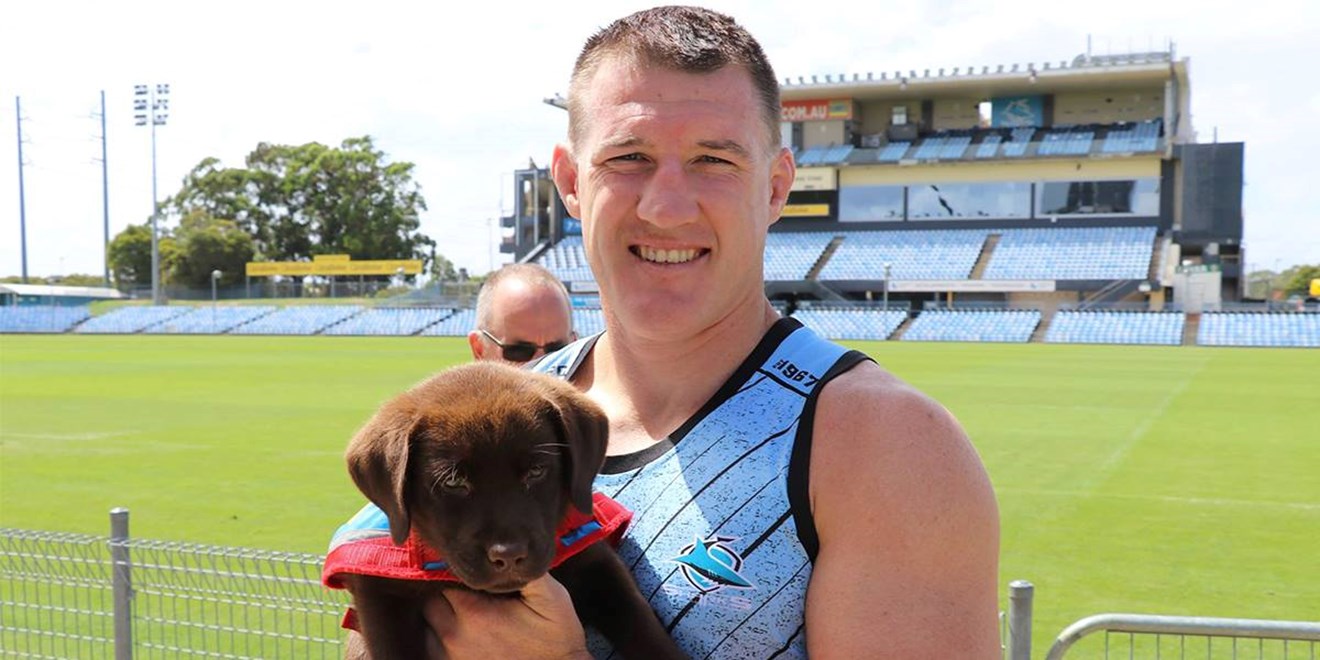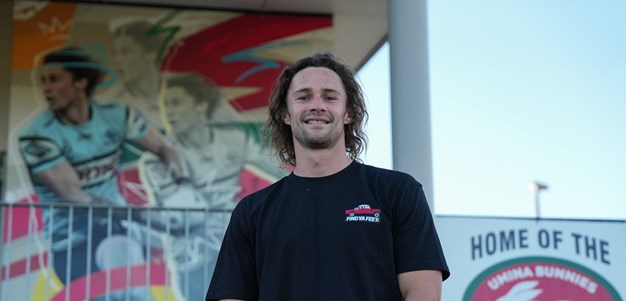

Assistance Dogs Australia have named one of their new pups after Sharks skipper Paul Gallen, in honour of his contribution to the Sutherland Shire, with the chocolate Labrador pup ‘Gallen’ about to embark on a journey to becoming a life-transforming Assistance Dog.
Gallen met Gallen at Southern Cross Group Stadium, with the pair striking up an instant bond, the Sharks version a self-proclaimed dog-lover and the puppy ‘Gallen’ an energetic friend to everyone at just eight weeks old.
The partnership and blossoming friendship was a result of two iconic Sutherland Shire-based groups supporting one another, the Sharks, and Paul, only too pleased to support a local charity organisation looking to raise awareness for the work they do.
The pup ‘Gallen’, in the early days of transforming into an Assistance Dog of the future, will one day truly change the world for someone in need.
Founded in 1996, Assistance Dogs Australia was created after Bob and Hannie Biggs became aware of the impact Assistance Dogs could have on people’s lives while on a trip to the US.
After up to two years of extensive training, specially trained Labradors or Golden Retrievers perform everyday tasks for people living with a wide range of disabilities.
Assistance Dogs Australia works with people living with physical disabilities such as paraplegia, quadriplegia, cerebral palsy, multiple sclerosis, as well as children with Autism and police and military personnel with Post-Traumatic Stress Disorder (PTSD). They also place dogs in educational facilities and ran a pilot program for people living with dementia.
The Sharks’ involvement with the pup Gallen will continue with regular updates on his journey and career path.
“We would dearly hope that one day, Paul could conduct the official handover of Gallen as a fully qualified Assistance Dog to his future client,” said CEO Richard Lord, Top Dog at Assistance Dogs Australia.
“Bestowing this little chocolate Lab with the name of their captain is a much-appreciated gesture of the Sharks and Paul Gallen’s goodwill, and encouragement of our work and the amazing results our dogs go on to achieve,” he said.
While the Sharks Gallen added; “It’s not often you get asked if you’d like to have a dog named after you. But this little fella has the makings of something very special. I hope he’ll go on to change someone’s life.”
For more information phone Assistance Dogs Australia on 1800 688 364 or visit the website at www.assistancedogs.org.au
About Assistance Dogs Australia
Assistance Dogs Australia was founded in 1996 by Hannie and Robert Biggs. After visiting a similar organisation in the US, they were inspired to create Assistance Dogs Australia.
Assistance Dogs are specially trained Labradors or Golden Retrievers performing everyday tasks for people living with a wide range of disabilities. They only use these breeds of dogs for a number of reasons; they are great family dogs, are well-received in the community, and are fantastic retrievers who love to work. They also have great physical strength and are a good size to help people with disabilities, especially those in wheelchairs, as they may be required to reach up and press buttons at traffic crossings, and pass wallets to cashiers at the counter.
Through an accredited training program, with Assistance Dogs International, these dogs aptly learn how to master specialised cues — from loading a washing machine and removing items of clothing for someone with a physical disability, to responding to signs of anxiety in children with Autism and sufferers of PTSD.
To train each dog to this level takes up to two years and costs over $35,000, this includes everything from food, vaccinations, training, placement and a lifetime of follow-up care.
To date, almost 300 Assistance Dogs have been placed throughout Australia, free of charge, providing up to 10 years of support for their clients. The charity receives no government funding whatsoever and relies heavily upon the generosity of individuals, corporates and community support to carry out this work.
There is a careful matching and placement process for each client and their dog, with each dog being trained to meet the specific needs of their owner. The average waiting time is 1-2 years for an Assistance Dog, with ongoing training, contact and support throughout this period. We currently have over 160 people on our waiting list, and the need is ever-growing.
People can apply for an Assistance Dog through the website, or can call to request an application pack. We review each application on a case-by-case basis. They currently only work in the following areas:
• people with physical disabilities
• children with Autism
• Sufferers of post-Traumatic Stress Disorder
• schools/ aged care facilities/ rehab centres/ palliative care and hospices
These Super Dogs can help their clients in the following ways:
• Assist with the development and improvement of motor skills
• Provide greater freedom and independence
• Reduce the need for a human carer
• Improve self-esteem and confidence
• Give unconditional love and companionship
• Be a great icebreaker and help their owner become more involved in the community reducing the feeling of isolation
Assistance Dogs Australia relies heavily on volunteers in the community, to raise the puppies for the 12-15 months of their lives. These Puppy Educators play a crucial role in teaching the puppy basic skills and socialisation, and the reward of knowing that the puppy they raised will help someone in need.
Through the Pups in Prison program, selected inmates and prison officers volunteer to train a dog. The program helps the inmate handlers to develop skills such as improved communication skills, increased self-confidence and team work. This program has been hugely beneficial to both Assistance Dogs Australia and the prisons involved, as it allows more dogs to be trained and placed with those in need, and sees the inmates gain new skills.






